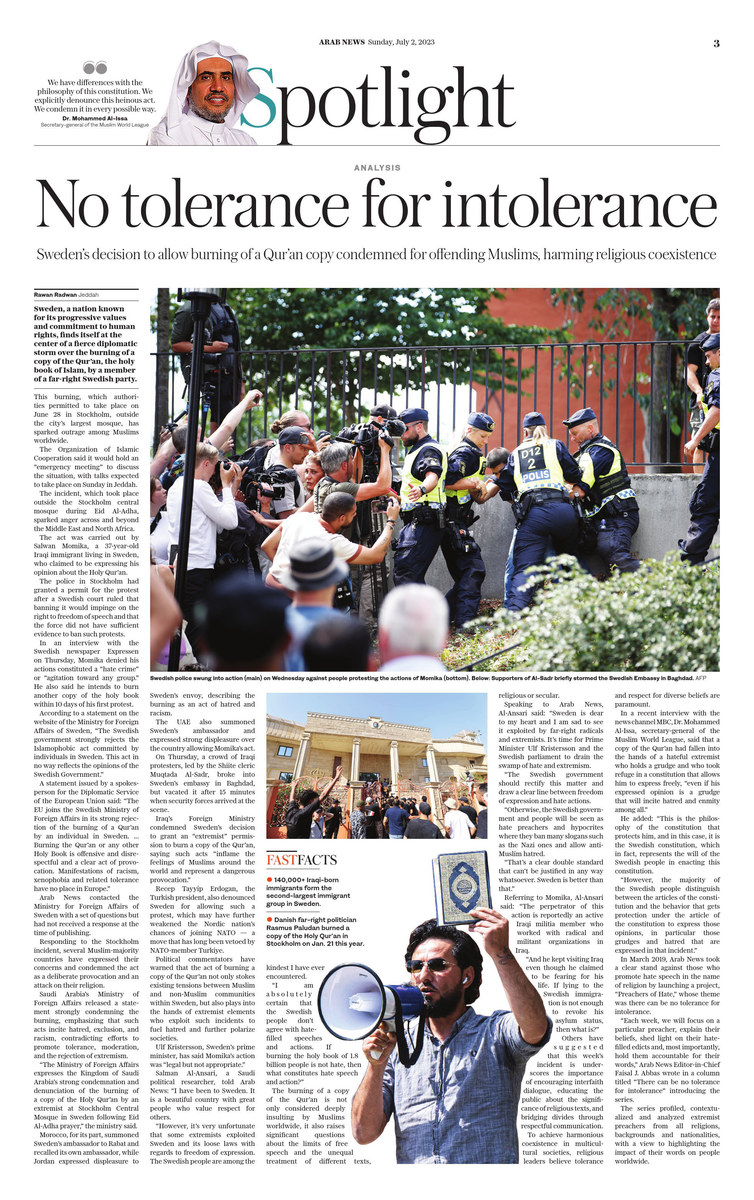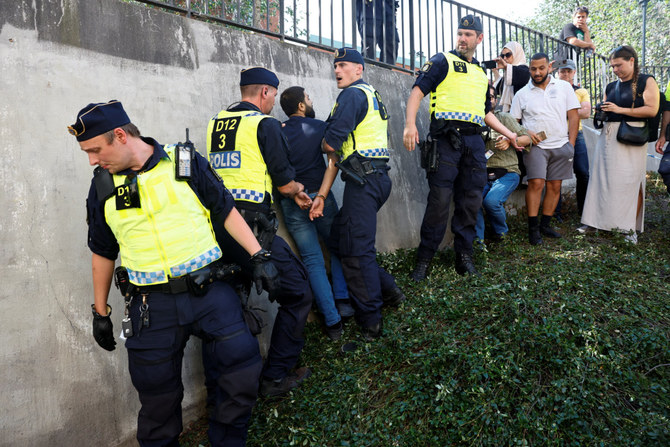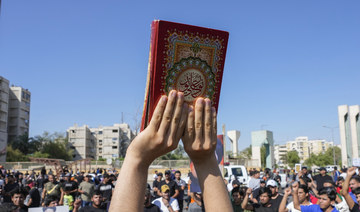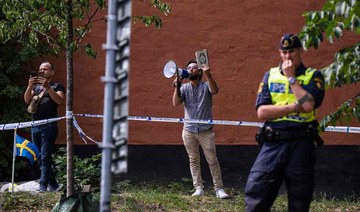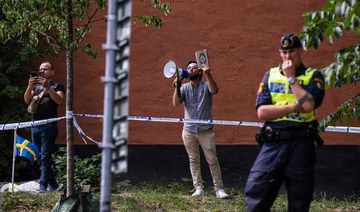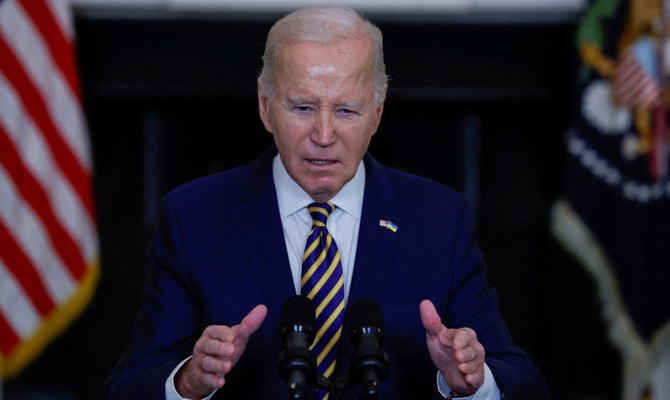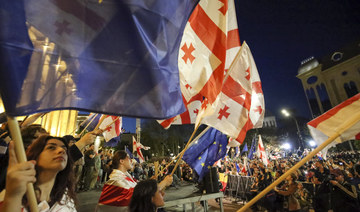JEDDAH: Sweden, a nation known for its progressive values and commitment to human rights, finds itself at the center of a fierce diplomatic storm over the burning of a copy of the Qur’an, the holy book of Islam, by a member of a far-right Swedish party.
This burning, which Swedish authorities permitted to take place on June 28 in Stockholm, has sparked anger and outrage among Muslims across the world.
The Organization of Islamic Cooperation, a 57-member group of nations, said it would hold an “emergency meeting” to discuss the situation, with talks expected to take place on Sunday.
According to a spokesman, the executive committee of the OIC will meet in the Saudi city of Jeddah to “discuss the measures to be taken against this heinous act and adopt a collective position on the necessary course of action.”
The incident occurred outside the Stockholm central mosque during Eid Al-Adha, a major Islamic holiday and the end of the annual Hajj pilgrimage to Makkah in Saudi Arabia.
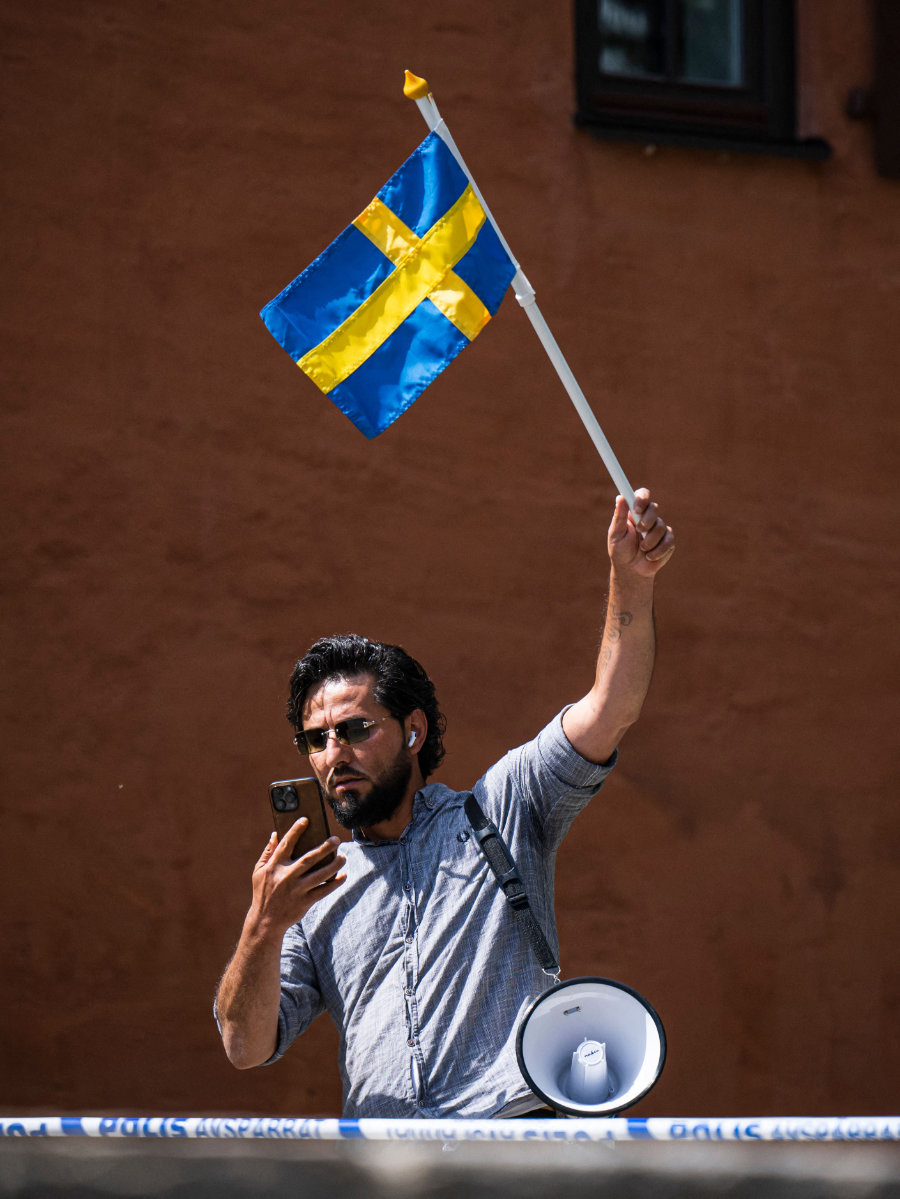
Salwan Momika, who fled from Iraq to Sweden several years ago, protests outside a mosque in Stockholm on June 28, 2023, during the Eid al-Adha holiday. He later tore up and burned a copy of the Muslim holy book. (Jonathan Nackstrand / AFP)
The act was carried out by Salwan Momika, a 37-year-old Iraqi immigrant living in Sweden, who claimed to be expressing his opinion about the Holy Qur’an.
The police in Stockholm had granted a permit for the protest after a Swedish court ruled that banning it would impinge on the right to freedom of speech and that the force did not have sufficient evidence to ban such protests.
In an interview with the Swedish newspaper Expressen on Thursday, Momika denied his actions constituted a “hate crime” or “agitation toward any group.” He also said he intends to burn another copy of the holy book within 10 days of his first protest.
According to a statement on the website of the Ministry for Foreign Affairs of Sweden, “The Swedish government strongly rejects the Islamophobic act committed by individuals in Sweden. This act in no way reflects the opinions of the Swedish Government.”
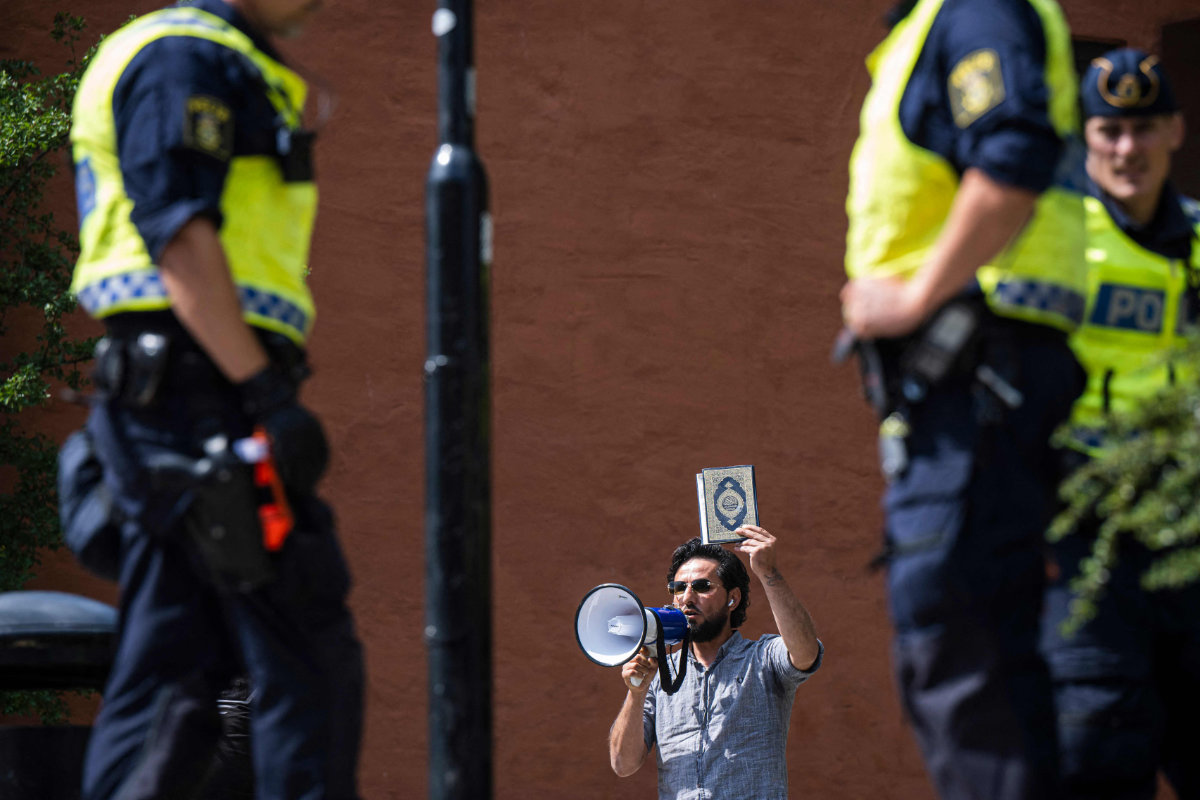
Swedish police allowed Salwan Momika, an Iraqi residing in Sweden, to tear up and burn a copy of the Qur'an during an unprovoked demonstration outside a mosque in Stockholm on June 28, 2023, as Muslims worldwide celebrated Eid Al-Adha. (Jonathan Nackstrand / AFP)
A statement issued by a spokesperson for the Diplomatic Service of the European Union said: “The EU joins the Swedish Ministry of Foreign Affairs in its strong rejection of the burning of a Qur’an by an individual in Sweden. ... Burning the Qur’an or any other Holy Book is offensive and disrespectful and a clear act of provocation. Manifestations of racism, xenophobia and related tolerance have no place in Europe.”
Arab News contacted the Ministry for Foreign Affairs of Sweden with a set of questions but had not received a response at the time of publishing.
Responding to the Stockholm incident, several Muslim-majority countries have expressed their concerns and condemned the act as a deliberate provocation and an attack on their religion.
Saudi Arabia’s Ministry of Foreign Affairs released a statement strongly condemning the burning, emphasizing that such actions incite hatred, exclusion, and racism, contradicting efforts to promote tolerance, moderation, and the rejection of extremism.
“The Ministry of Foreign Affairs expresses the Kingdom of Saudi Arabia’s strong condemnation and denunciation of the burning of a copy of the Holy Qur’an by an extremist at Stockholm Central Mosque in Sweden following Eid Al-Adha prayer,” the ministry said.
“These hateful and repeated acts cannot be accepted with any justification, and they clearly incite hatred, exclusion, and racism, and directly contradict international efforts seeking to spread the values of tolerance, moderation, and rejection of extremism, and undermine the necessary mutual respect for relations between peoples and states.”
FASTFACTS
140,000+ Iraqi-born immigrants form the second-largest immigrant group in Sweden.
Danish far-right politician Rasmus Paludan burned a copy of the Holy Qur’an in Stockholm on Jan. 21 this year.
Morocco, for its part, summoned Sweden’s ambassador to Rabat and recalled its own ambassador, while Jordan expressed displeasure to Sweden’s envoy, describing the burning as an act of hatred and racism.
The UAE also summoned Sweden’s ambassador and expressed strong displeasure over the country allowing Momika’s action. In a statement, Dr. Anwar Gargash, a diplomatic adviser to the UAE president, said: “The blatant and repeated attacks on our Islamic faith under the pretext of freedom of opinion perpetuate hatred and rivalry.”
On Thursday, a crowd of Iraqi protesters, led by the Shiite cleric Muqtada Al-Sadr, broke into Sweden’s embassy in Baghdad, but vacated it after 15 minutes when security forces arrived at the scene.
Iraq’s Foreign Ministry condemned Sweden’s decision to grant an “extremist” permission to burn a copy of the Qur’an, saying such acts “inflame the feelings of Muslims around the world and represent a dangerous provocation.”
The ministry said it had summoned the Swedish ambassador to Baghdad to inform her of the country’s “strong protest” over the authorization decision.
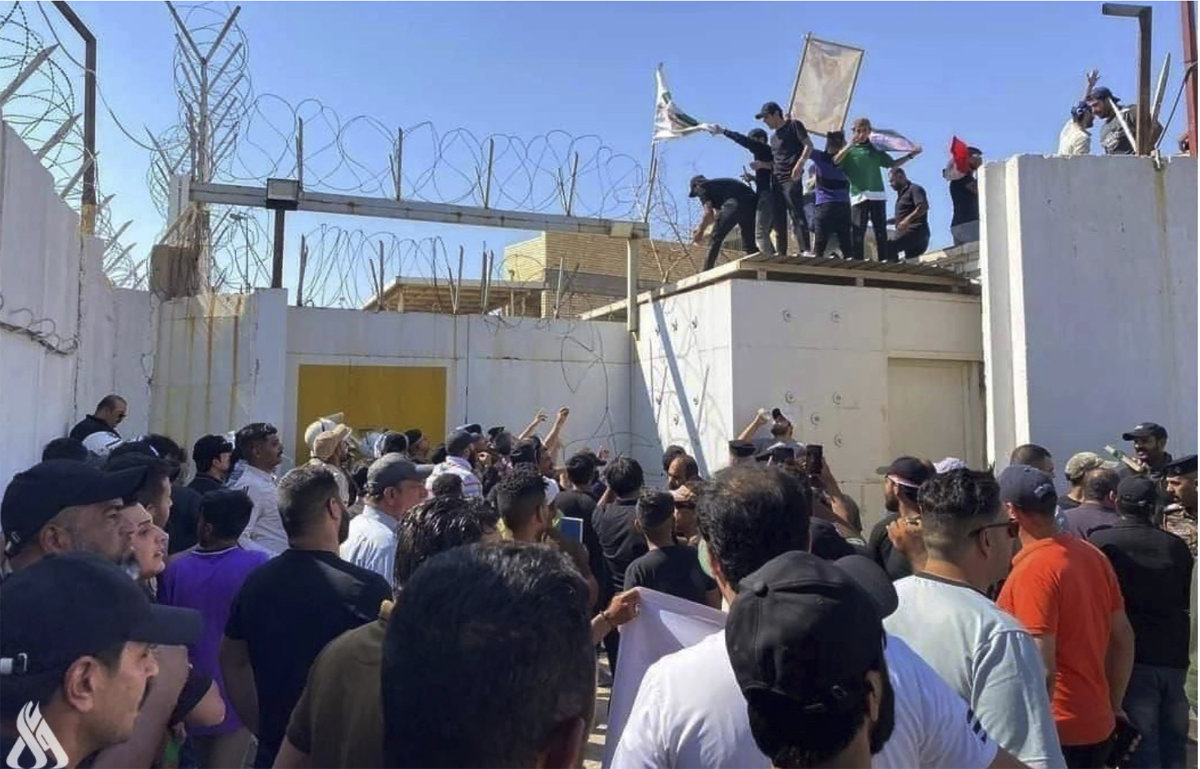
Supporters of Shiite Muslim leader Moqtada Sadr demonstrate inside the courtyard and outside the Swedish embassy in Baghdad on June 29, 2023, to protest the burning of the Qur'an by an Iraqi living in Sweden. (Photo by Ahmad Al-Rubaye / AFP)
Recep Tayyip Erdogan, the Turkish president, criticized Sweden for allowing such a protest, which may have further weakened the Nordic nation’s chances of joining NATO — a move that has long been vetoed by NATO-member Turkiye.
“We will eventually teach the arrogant Westerners that insulting Muslims is not freedom of thought,” Erdogan said in televised remarks. “We will show our reaction in the strongest possible terms, until a determined victory against terrorist organizations and Islamophobia is achieved.”
Political commentators have warned that the act of burning a copy of the Qur’an not only stokes existing tensions between Muslim and non-Muslim communities within Sweden, but also plays into the hands of extremist elements who exploit such incidents to fuel hatred and further polarize societies.
Previous incidents involving the desecration of sacred texts have also faced condemnation. In 2015, a far-right politician burned a copy of the Qur’an outside a mosque, and earlier this year, an Egyptian living in Sweden planned to burn the Torah in front of the Israeli Embassy in Stockholm to spark a debate on the Palestinian cause.
However, Muslim leaders in Sweden intervened to prevent the action, with both Muslim and Jewish clergy speaking out against the desecration of sacred texts as a form of protest.
Ulf Kristersson, Sweden’s prime minister, has said Momika’s action was “legal but not appropriate.”

Sweden's Prime Minister Ulf Kristersson talks to the media at the EU headquarters in Brussels on June 29, 2023. (AFP)
Salman Al-Ansari, a Saudi political researcher, told Arab News: “I have been to Sweden. It is a beautiful country with great people who value respect for others.
“However, it’s very unfortunate that some extremists exploited Sweden and its loose laws with regards to freedom of expression. The Swedish people are among the kindest I have ever encountered.
“I am absolutely certain that the Swedish people don’t agree with hate-filled speeches and actions. If burning the holy book of 1.8 billion people is not hate, then what constitutes hate speech and action?”
Highlighting concerns about a selective approach to freedom of expression, some political analysts say that the response by a Western country might have been different had the protest been against a different faith or a popular political cause.
They contend that desecration of a Jewish religious symbol, for example, would likely have invited charges of antisemitism; similarly, any protest directed against black people would certainly have fallen foul of laws banning racism.
In the last week of April, a group of self-proclaimed Satanists cheered as two leaders opened SatanCon 2023 in the US city of Boston, with a formal ceremony renouncing “symbols of oppression” by ripping up a Bible and a “Thin Blue Line” flag representing police.
Commenting on a Fox News video of the actions on Twitter, Al-Ansari made clear his views on the desecration, saying: “As a Muslim, I say these Satanist actions against Christianity and the Bible are nothing but deplorable, disgusting and full of hatred towards people of all faiths.
“How can ripping up a Bible help? Who are the behind-the-scenes enablers of this hate cult?”
The burning of a copy of the Qur’an is not only considered deeply offensive by Muslims worldwide, it also raises vital questions about the limits of free speech and the unequal treatment of different texts, religious or secular.
While freedom of expression is a fundamental human right and a cornerstone of democratic societies, many political scientists believe it should not be considered an absolute right that enables the incitement of hatred or the deliberate denigration of religious beliefs.
Speaking to Arab News, Al-Ansari said: “Sweden is dear to my heart and I am sad to see it exploited by far-right radicals and extremists. It’s time for Prime Minister Ulf Kristersson and the Swedish parliament to drain the swamp of hate and extremism.
“The Swedish government should rectify this matter and draw a clear line between freedom of expression and hate actions.
“Otherwise, the Swedish government and people will be seen as hate preachers and hypocrites where they ban many slogans such as the Nazi ones and allow anti-Muslim hatred.
“That’s a clear double standard that can’t be justified in any way whatsoever. Sweden is better than that.”
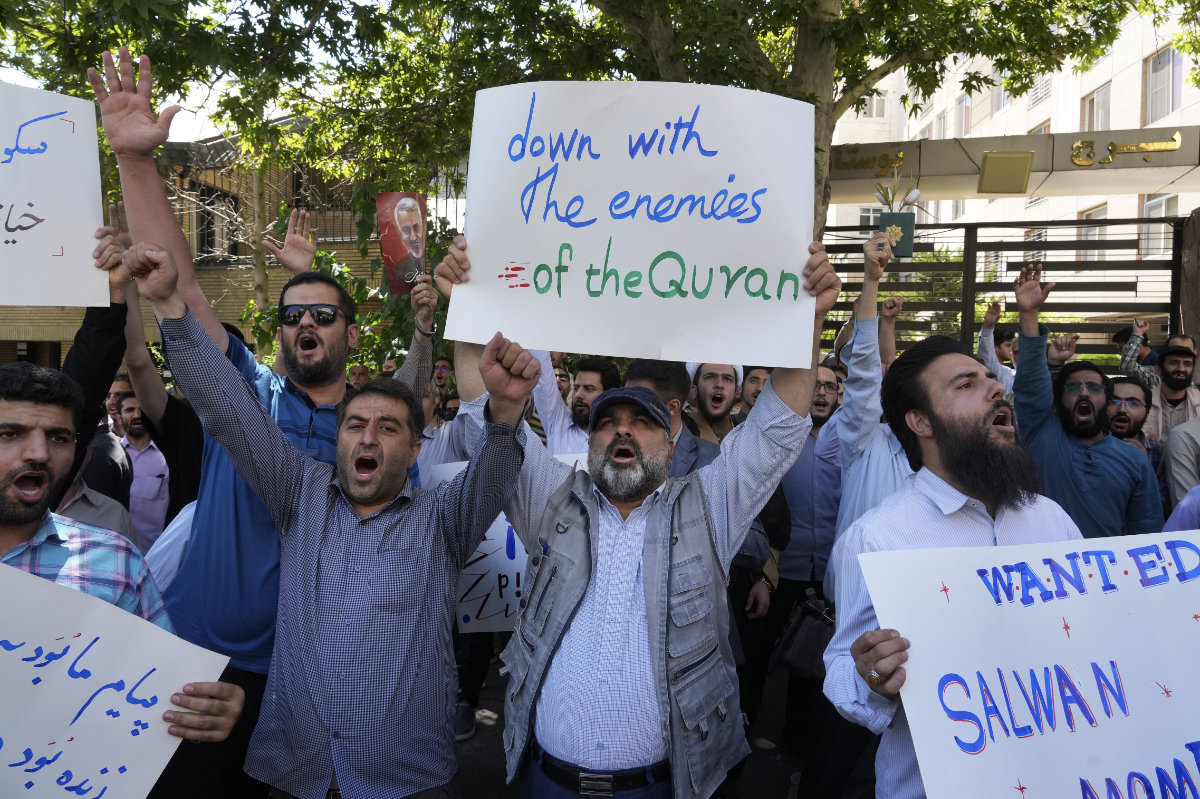
Iranians demonstrate in front of the Swedish Embassy in Tehran on June 30, 2023, to protest the burning of a Qur'an by Islamophobes in the Swedish capital earlier. (AP)
Referring to Momika, Al-Ansari said: “The perpetrator of this action is reportedly an active Iraqi militia member who worked with radical and militant organizations in Iraq.
“And he kept visiting Iraq even though he claimed to be fearing for his life. If lying to the Swedish immigration is not enough to revoke his asylum status, then what is?”
Others have suggested that this week’s incident underscores the importance of encouraging interfaith dialogue, educating the public about the significance of religious texts, and bridging divides through respectful communication.
In order to achieve harmonious coexistence in multicultural societies, religious leaders believe tolerance and respect for diverse beliefs are paramount.
While freedom of speech remains crucial, they believe it must be exercised responsibly, taking into account the potential consequences and respecting the sensitivities of others.
In a recent interview with the news channel MBC, Sheikh Dr. Mohammed Al-Issa, secretary-general of the Muslim World League, emphasized that a “copy of the Holy Qur’an, not the Qur’an,” had fallen into the “hands of a hateful extremist who holds a grudge and who took refuge in a constitution that allows him to express freely, “even if his expressed opinion is a grudge that will incite hatred and enmity among all.”
He added: “This is the philosophy of the constitution that protects him, and in this case, it is the Swedish constitution, which in fact, represents the will of the Swedish people in enacting this constitution.
“However, the majority of the Swedish people distinguish between the articles of the constitution and the behavior that gets protection under the article of the constitution to express those opinions, in particular those grudges and hatred that are expressed in that incident.
“In general, the (Swedish people) do not agree with these grudges and hatred. They reject them. However, they say ‘This is his right to express his opinion as long as it does not (commit) a harmful action that is tangible.’”
Al-Issa, who deems Momika’s actions a crime, added: “We have differences with the philosophy of this constitution. We explicitly denounce this heinous act. We condemn it in every possible way.”
In March 2019, Arab News took a clear stand against those who promote hate speech in the name of religion by launching a project, “Preachers of Hate,” whose theme was there can be no tolerance for intolerance.
Opinion
This section contains relevant reference points, placed in (Opinion field)
“Each week, we will focus on a particular preacher, explain their beliefs, shed light on their hate-filled edicts and, most importantly, hold them accountable for their words,” Arab News Editor-in-Chief Faisal J. Abbas wrote in a column entitled “There can be no tolerance for intolerance” introducing the series.
The series profiled, contextualized and analyzed extremist preachers from all religions, backgrounds and nationalities, with a view to highlighting the impact of their words on people worldwide.
